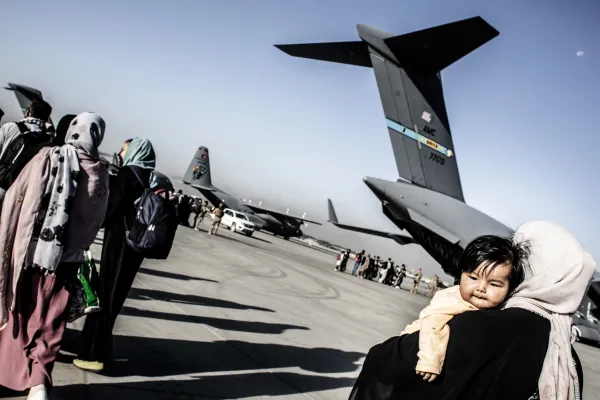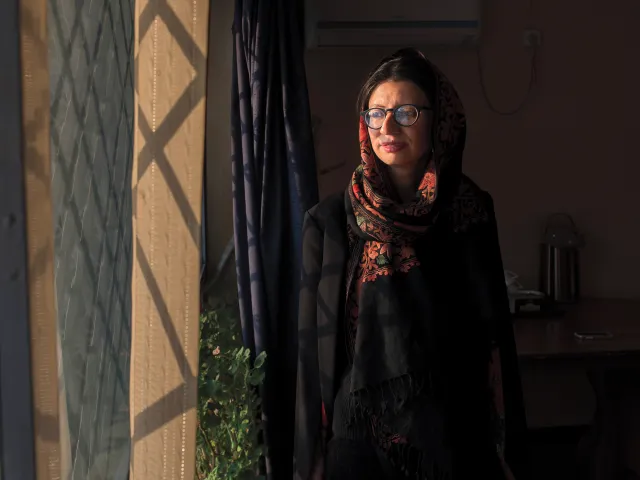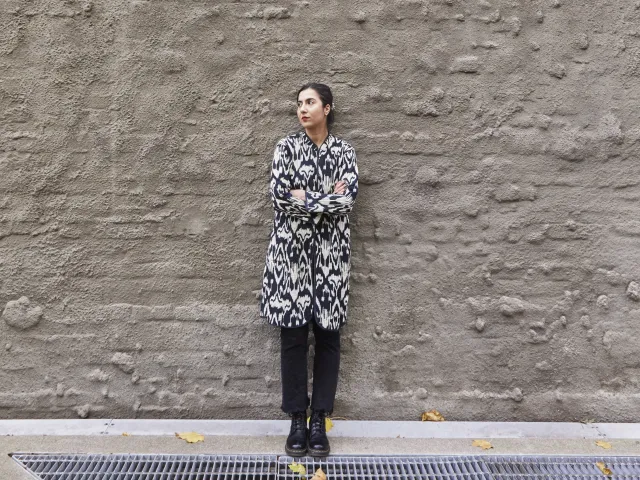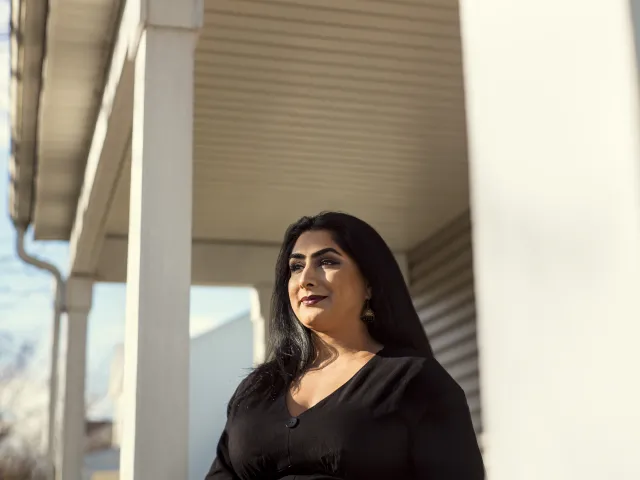‘None of Us Are OK’
News of Note
Journalist Simran Sethi ’92 reached out to Afghan members of the Smith community in the weeks after the fall of Kabul. Their conversations are a snapshot of the emotional pain, fear, anger, and hopelessness of that historic time.
Published January 6, 2022
In the six weeks between the fall of Afghanistan’s capital, Kabul, in August and the 20th anniversary of the 9/11 attacks, I reached out to Afghan members of the Smith community to check in on them and to document their reflections on the events unfolding in their homeland. The conversations that follow—each accompanied by a brief account of the day’s top news story—are a snapshot of that time: the lived experiences of our Smith siblings as they worked relentlessly to protect the people and the country they love while processing the immediate shock, fear, and hopelessness of the end of the American occupation of Afghanistan.
August 15, 2021—The BBC reports that the Taliban has claimed victory in Afghanistan after taking over Kabul, bringing to a swift end almost 20 years of a U.S.-led coalition’s presence in the country.
Shaharzad Akbar ’09 returns my call from a hotel in Istanbul. It’s late in the evening. She speaks softly so as not to awaken her 2-year-old son. I start with the question I will ask everyone with whom I speak: “Are you OK?” She draws in a heavy breath: “I’m between being numb and exhausted—really, really exhausted—but that’s how it is for now. That’s how it’s going to be for a while. None of us are OK.”
Shaharzad Akbar ’09 has long been an advocate for Afghan citizens. She worries every day about the safety of friends and family left behind. | Photograph by Kiana Hayeri/Verbatim.
Her resignation and fatigue are lodged deep. The 34-year-old humanitarian advocate has dedicated her life to supporting Afghans, most recently as chair of Afghanistan’s Independent Human Rights Commission. A weeklong respite from work quickly shifted into an escape from a regime known the world over for brutality and subjugation. “When I got on my flight, everything was normal. Then I came online a few hours later and learned that the president had fled and Kabul had been taken over. It moved unbelievably quickly, and I was devastated. I still hope I can return to my homeland, but I know our return will be delayed with no certainty about when we can go back.”
“I am numb and exhausted, but that’s how it is. That’s how it is going to be for a while.”—Shaharzad Akbar ’09
I asked her what to call the sudden change. Was the United States’ departure a withdrawal, or would she define it as something else? “I have to rethink that whole relationship,” she says, her voice rising. “It wasn’t a partnership. It wasn’t benevolent patronage. I don’t want to call it abandonment because I don’t think we ever had real partners in the U.S. who could then abandon us.”
Despite this anger (“over the U.S. administrations—not just Biden, Trump”), she stresses that there are people she holds in great regard: “When I think about the U.S., I also think about people that I met at Smith, people that I’m still friends with, people who care deeply and are very thoughtful about bigger issues that impact all humanity.”
For the moment, Akbar’s overwhelming concern is for those left behind, including friends and family in Kabul. “I still haven’t processed what our government did to us. I will get to that at some point. But, right now, actual human beings that I love and care for, and are important to Afghanistan, are at risk. What’s going to happen to them? What will be the Taliban’s behavior?”
She is especially worried about victims of domestic violence. “These women who are beaten up by their husbands—some to the point that they were about to be murdered—fled their homes and came to a shelter. The Taliban has stopped the work of shelters and safe houses. These women are left at the mercy of the same people who abused them, because the Taliban also freed [the abusers] from the prisons.”
The human rights situation in Afghanistan will continue to deteriorate, Akbar says, especially for women: “All [women] are impacted in varying degrees; no one will be spared. As a global community, we should not allow this to happen. We should not just be bystanders. We should try to continuously engage and try to find ways to change this.”
August 29, 2021—An article in The New York Times notes that a drone strike in Kabul—considered the final act of the U.S. war in Afghanistan—kills 10 people, including seven children and a man the military saw as an “imminent threat” and “ISIS facilitator,” but who was actually an aid worker returning to his family.
Mina Zahine ’15 video chats with me from her home near Toronto. She is the daughter of Afghan refugees who fled to Pakistan in 1984 but returned to Afghanistan with their family years later. Zahine herself has been living in Canada since 2019, when the situation in Afghanistan began to deteriorate and her safety became an issue. “We knew where this was headed because the U.S. was negotiating with the Taliban, and Afghans weren’t part of the negotiations,” she recalls. “My brothers had a visa [to Canada], and I remember my dad very clearly saying to me: ‘I want you to go—and stay—because I’m not sure how much longer I can protect you.’”
Mina Zahine ’15 says she has yet to grieve the loss of her beloved homeland as she knew it and won’t until she knows everyone is safe. | Photograph by Derek Shapton.
Her father—a man who had spent most of his life in Afghanistan, leaving at the beginning of the Soviet invasion and later returning to fight for Afghan independence—had never uttered those words before. “He’d been through everything: the Taliban regime, all of the changes. He is someone who doesn’t get fazed easily and was always very calm under pressure. So, to hear that from him, I knew it was going to get worse. That’s why I came here.”
When the government collapsed, her father was out of the country. Her mother—a member of the Afghan Parliament since 2005—had to be quickly evacuated, moving from Kuwait to Bahrain to the United States and, finally, to Canada. Zahine is happy her mother is out of Afghanistan, but that joy is tempered by her mother’s grief: “She didn’t want to leave and is really sad that she has to be here, but her life was in danger. One of the people who is part of the new government has tried to assassinate her, or have her assassinated, on multiple occasions.”
As she shares this, Zahine’s tone is steady, belying feelings of terror and distress. It is an inflection I will hear in the voices of other Smith siblings as they recount how their families and loved ones face the same possible fate.
“When the U.S. came into Afghanistan, they toppled the Taliban government. Obviously, none of us wanted [the Taliban], but after that, rather than focusing on infrastructure building, nation building, helping the Afghan people, and bringing aid, they waged a full-scale war on Afghan soil—as a result of which, you know, a lot of Afghan civilians were killed.” (A 2020 United Nations report found the number of annual civilian casualties in Afghanistan exceeded 10,000 for six years running. A follow-up report found an unprecedented increase in civilian deaths in the first half of 2021, up 47% compared to 2020.)
The occupation also created an environment of dependence, Zahine says. “The Afghan people, the government, even the military became so dependent on U.S. support. To pull it out like that, without any consideration for the impact that it would have, it’s so infuriating.”
“The Afghan people became dependent on U.S. support. Pulling out was infuriating.”—Mina Zahine ’15
For her parents and others who have actively worked to support the country through humanitarian and civil service, the withdrawal was devastating: “People have been working so hard to help their country get back to where it was before all of this started 40 years ago, to the Afghanistan that they remember. For them, it’s heartbreaking on another level because all this work that they did, it’s like, ‘Where did it all go?’ It felt like it vanished before their eyes. And now we’re hearing stories of people who have any connection to the U.S. being hunted down. Those people who were promised safety and security have been completely abandoned. They’re terrified.”
This trauma crosses generations and borders, Zahine says. But she refuses to succumb: “I haven’t gotten to the point where I have allowed myself to lose it and cry because there’s a lot of work that needs to be done. It’s painful not being able to mourn because you’re just so focused on helping your people, but I am not able to grieve until we can make sure that they are safe.”
August 30, 2021—CNN reports that the last U.S. military planes have left Afghanistan, marking the end of a “fraught, chaotic and bloody exit from the United States’ longest war.”
“It’s such a surprise that we’re going back to the same regime that the U.S. fought for 20 years to get rid of,” Meetra Ameni ’14 says as she settles into our conversation. The young mother has been working full time and single-handedly raising her 3-year-old son as she tries to comprehend the enormity of the unknown. “The situation in Afghanistan is unpredictable. People are pouring into the streets, protesting. It looks like something major is going to happen, and either the people are going to win or there will be a major civil war.”
Meetra Ameni ’14 admits to feeling guilty for living comfortably in the U.S. while so much uncertainty remains for those still in Afghanistan. | Photograph by Paul Elledge.
In light of this chaos, I ask Ameni—who is living in a suburb of Chicago—if she’s glad she and her son are here. “The truth? I hate being in this place right now. It doesn’t feel right that I’m living here, when there are people dying on the street there. It doesn’t feel right that I get to feed my son when there are children internally displaced, on the streets and hungry. I hate being in my comfortable home.” The borders are closed, people’s bank accounts have been limited or frozen, and shops are running out of food and supplies. “There’s no system. Because of all these uncertainties, because of all this mess that has been created in the last month, people are dying.”
Like other Smith alums from Afghanistan, Ameni struggles with where her allegiance lies. “Even though I live in the U.S., I’m there,” she says, referring to her home country. “There’s not one single family that you will see in the U.S., Canada, Europe, or all over the world who thinks we can carry on with our lives. Every Afghan that you see abroad right now is depressed.”
Ameni was 7 years old when the Taliban was last in power: “It’s when I lost my childhood,” she says. After six months under Taliban rule, her family fled. “There was no train, no car, no cow, no donkey; my dad was holding me in his arms as we walked to Pakistan.” The seven years that followed were what she describes as “hell,” a life defined by scarcity. “As an Afghan immigrant in Pakistan, you could not have the same liberty to do anything in a foreign country. We never had enough food or clothes. My dad would bring home receipts from customers from his work. I would use the other side of the receipt as a white paper, and then write my homework on it. This is how I got my education in Pakistan.” She went on to win a full scholarship to Smith, where she studied government and dreamed of effecting change in her home country.
“The regime change will not set people back 20 years; it will be 200 years.”—Meetra Ameni ’14
“We worked hard to create those dreams and hopes because we were able to see a future. In this last 20 years, we worked hard to make a social system, a ministry for education, a ministry for women. The impact of this [regime change] on the new generation is not that people are going to be set back 20 years; it will be 200 years.”
September 7, 2021—From CNN: “No women or members from Afghanistan’s ousted leadership were selected for acting cabinet positions or named to advisory roles, in spite of the Taliban’s promises of an inclusive government.”
On the one-week anniversary of the withdrawal of U.S. troops, Tamana Attai ’22 sends me a short message: “My family is still in Afghanistan. They are waiting for the land borders to open to go to Pakistan.” I type back, “What are you feeling?” Her response burrows into me: “Hopeless and helpless. I tried everything, but could not get my family and friends out.”
Attai was last in Afghanistan 5½ years ago, living in Kabul with her parents and three younger siblings. She came to the U.S. for high school and then stayed to attend Smith, where she now studies political science. But her goal, she tells me on a phone call, has always been to return home. “If you ask any Afghan student growing up, ‘What do you want to be?’ they’re going to say they want to be the president.” All the professors she was close to also knew: “I told them, ‘I’m going to be the president.’”
This is the dream of a girl who describes herself as a “product of American democracy in my country.” She wishes the U.S. had “known the history, the complexity, and the ethnic culture like linguistic differences in my country before stepping in it,” but she recognizes that the occupation was of value. “My generation is grateful for the American intervention. Even if it was a fail … we got educational opportunities that we could never have had under the Taliban regime or any other invader. Thousands of men and especially women now hold a bachelor’s and a master’s. They were active in the workforce…” Her voice trails off as she speaks in past tense: “They were active.”
Attai comes from Ghazni, a mineral-rich province that borders Pakistan and is home to a significant number of the country’s Hazara people. The Hazaras are an ethnic minority known for their distinct features and language, and their practice of Shia Islam. They have been a primary target of discriminatory and violent repression, including what Attai describes as the “genocide” of 1998, when the Taliban were last in power. “They are anti-Hazara,” she says bluntly. “If they get [the Hazara people], they’re going to kill them.”
We sit together in silence, the weight of this statement between us. This is why her family is in hiding. “They are changing place constantly because the Taliban are searching people’s houses at night—and I’m not a person who can do anything about it. I’m just a college kid learning politics. I reached out to everybody that I knew through the college, to the alums, to the people that I have known since I have lived [in the U.S.], but it was not enough.” (Editor’s note: After multiple failed attempts over two harrowing months, Attai’s family has successfully left the country.)
September 11, 2021—Editors for The Guardian write, “The establishment of a Taliban government in Kabul, two decades after the U.S. ousted the militants for harbouring Bin Laden, has underscored two things: that far from reasserting its global supremacy, the U.S. looks more vulnerable today; and that the echoes of 9/11 are still reverberating across the region—but will not stay there.”
My outreach to Simin Saba Royesh ’21 started in early September, just after she and her family had been evacuated from Afghanistan: “I am currently in a military camp in Doha [Qatar] with my family,” she wrote after my initial inquiry. “We have been told to be on call for our flight any minute or day.” Then, a few days later: “I am right now on a flight from Germany to the U.S. I am not sure what is next for us. I am also afraid to set a time and date [to speak] since they might send me somewhere, just like the past two days, where there is no internet connection. Please bear with me.” And a few days after that: “My family and I are currently stationed in an airbase in Quantico, Virginia. We are not allowed to get out of here until our documents are processed. There’s only a certain period that the Wi-Fi signal is just good enough for text messages or sending emails.”
We decide I will email my questions. On 9/11, I receive her full response, which follows.
“Please accept my apologies for responding late to your questions. I could barely find a good internet connection, and also it took me a while to come up with answers. It was, honestly, a difficult process.
“You ask, how am I? Confused, lost, enraged, stateless, sad, in a state of denial. Nothing happening in Afghanistan is deserving of a nation in the world. I am mad at all my countrymen, civil rights activists, and those involved in [renewal] projects who never thought of a long-term plan for the future of Afghanistan. We knew that the United States was going to leave Afghanistan, yet as a nation we never took the time to come up with strategic plans. All these years, the only thing that our authority holders did was to pour the nation’s money into their bank accounts and publish false reports about the progresses made in different sectors.
“I am also mad at the international community, especially the United States, for acting as the know-it-all and giving itself the audacity to decide on behalf of a nation whose culture and history it knows the least. Legitimizing a terrorist group and giving them power was the last thing I expected from a nation that always takes pride in promoting democracy.
“Hope for the future rests with the generation of Afghans outside of the country.”—Simin Saba Royesh ’21
“Right now, the Taliban are violating international human rights law by suppressing peaceful demonstrations, depriving women of their rights to work and to education, and violating freedom of press, yet there is no international organization to talk about it and give them an ultimatum. Instead of putting limitations on the Taliban, the international community has again taken policies that harm Afghan people. Cutting off money, for example, does no harm to the Taliban.
“I went back to Afghanistan right after graduation because I wanted to be a part of the new forces working toward bettering the living situation of many Afghans. Life was not perfect … but at least I knew there was a place that I could always run into at my lowest and heal my broken soul. To say the least, I have lost that safe space. My only hope at this point is geared toward the generation of Afghans who are outside the country. I am looking forward to the fact that every Afghan outside can use this opportunity to work on their skills and their knowledge, so one day they can go back to Afghanistan and take charge of the country.”
How You Can Help
Alums can offer direct support through various fundraising initiatives. You can reach out to Meetra Ameni ’14 via email at adafghanrelief@gmail.com. Mina Zahine ’15 suggests contributing to the Durkhanum Sewing Circle (chuffed.org/project/durkhanumsewing) to help women who have lost jobs and educational opportunities develop skills in tailoring in order to support their families. The U.S. Department of State recently launched a Sponsor Circle Program for Afghans, enabling individuals and community groups across the country to provide resettlement assistance to Afghans who have been relocated to the United States. Details can be found at welcome.us.
Simran Sethi ’92 is an award-winning journalist and scholar and a 2009 recipient of the Smith College Medal.
This story appears in the Winter 2022 issue of the Smith Alumnae Quarterly.
Messages to the Smith Community
Now is not the time for silence, say Afghan alums.
SHAHARZAD AKBAR ’09
“Regardless of where you are from and where you live, what’s happening to women in Afghanistan should not be acceptable. When one of the spokespeople of the Taliban goes on TV and says, ‘Women are not fit to govern, they’re physically and mentally unable to do that,’ it should create a sense of outrage from everyone, not just Afghan women. It should be leading to protests [and] outrage across the world.”
MIENAH SHARIF ’05
“We were given such a rich and unique opportunity to be trained in the way that we were. I think it does [Smith] and the broader society a disservice if [our engagement] ends after we graduate. As Smith graduates, our belief in the principles of equity, women’s rights, and education should go beyond the curriculum and be reflected in our practice as we consider the economic policies that are impacting the people of Afghanistan. What about international laws or what’s happening domestically? Are you involved in local politics? Do you know your representatives’ stances on what’s going on? What is your community doing to welcome refugees?
“No matter what sector one is working in, it’s important to recognize that we have resources that can directly benefit this situation; there is not one single approach or solution. We are all directly connected to what’s going on, because inequalities in one context impact us all.”
SIMIN SABA ROYESH ’21
“As an institution, Smith can do a few things: First, provide educational opportunities for a number of Afghan students, and second, offer courses that teach about what is happening in Afghanistan. A lot of false information is being poured into the minds of many people. Everyone believes Americans were the angels who were trying to save a nation, yet the nation itself failed. Let’s teach our students the true history so when they grow up, they have sympathy toward their fellow human beings.”
Kabul airport: U.S. and other NATO forces evacuating refugees to safety outside of Afghanistan. | Photograph by Andy Spyra/Laif/Redux.



